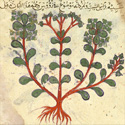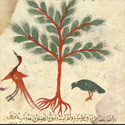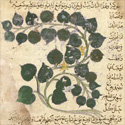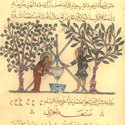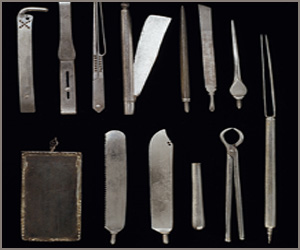Medicine & Related sciences

|
Most works on the history of any
science hardly, if ever, devote more than a few pages to the
Islamic role, a few paragraphs being the rule. What is written
is generally that such Islamic science was copied from the
Greeks. The same historians also write that fanatical Islamic
Orthodoxy harmed sciences, and persecuted scholars and left a
climate of fear that hindered the growth of such sciences. This
generalised approach tending at distorting, and belittling
Islamic science is strongly present in the history of medicine.
The first heading will run through some of its aspects, and then
the following headings, with facts, will show how Western
history of Islamic medicine, a handful of exceptions aside, is
moribund and fundamentally corrupt, at the same time.
The
first generalised
problem amongst Western historians is a failure to acknowledge
Islamic accomplishments, and demeaning, and even suppressing
them as much as possible. One goes through most works on the
history of medicine, and however large some of them are, the
best devote three to four pages to the Islamic period, generally
repeating the aberrations found in their predecessors or
contemporaries, especially amongst modern historians. Underwood,
in his history of medicine and medical practice, in two large
volumes, devotes not a single page to Islamic medicine, as if
the Muslims never knew of, or wrote on, the subject.[1]
Some works deliberately erase any Islamic accomplishment, even
when they are supposedly explaining the role of Islamic
medicine. Anything published today on Islamic medicine by
Western scholars, with one or two exceptions aside (Jacquard,
Micheau, for instance), in reality aims at suppressing Islamic
accomplishments attributed by older scholars to Muslims, these
modern scholars then re-attributing such accomplishments left
and right to others, ending up confusing the history of the
subject. Nagamia, for instance, notes how:
‘Historians of medicine have erroneously suggested that the
science of anatomy during the Islamic era was rudimentary, and
did not progress much further than the discoveries already made
and described by the Greeks. It was popularly held that Islamic
physicians did not challenge the anatomic concepts of the
ancients, partly because of the "religious proscription" against
dissection, and thus, lacking in their own observations, they
relied heavily on the observations of Galen, Aristotle, Paul of
Aegina, and other Greek sources. However, after recent
discoveries of manuscripts by an Egyptian physician, al-Tahtawi,
that had been hitherto un-scrutinised, it would appear that
Islamic physicians not only possessed an excellent knowledge of
anatomy, but that they added some challenging new concepts that
were revolutionary to the understanding of the day of the
anatomical concepts laid down by the Greeks. The example that is
now well-known is the discovery of the lesser or pulmonary
circulation by Ibn al-Nafis (1210-1288), who suggested that
there existed a pulmonary capillary bed where the blood was
purified before being brought back by the pulmonary artery It
ought also to be mentioned that Ibn Masawaih (777-857) had, with
the special permission of the Caliph, built a house on the banks
of the river Tigris where he dissected apes to learn their
anatomy, and extrapolate from those results what information he
could that would shed 1ight on human anatomy. Al-Zahrawi
(936-1013), in the surgical section of his book al-Tasrif
also offers his comment on anatomy.’[2]
If
and when historical facts prove a strong Muslim scientific
influence in any subject or area, Western historians typically
then demean their value as much as they can, such as by
stressing their negligible and even negative role. Here, we are
back to the sort of instances cited in part one, whereby,
according to Western historians, Muslim cities are not cities,
hospitals are not hospitals, military victories mere slaughter
of enemy patrols, or even of shepherds, and so on and so forth.
Thus, with regard to Muslim medicine, and the rise of Salerno,
the first medieval university, for instance, Rashdall and his
followers, that is the near entirety of Western scholarship,
after explaining to us that Muslim universities were not
universities (even if Western universities came centuries after
the Islamic, adopting their organisation, and rising and
thriving on Islamic learning in the 12th century)
tells us, quote:
‘So
far from the rise of the fame of
Of
course, assertions such as these are historically false. First,
it was not Muslim learning that destroyed
Secondly, generally Western historians praise the impact of
Thirdly, when we examine the role of
Finally, Rashdall is wrong, for any examination of modern
medical learning, in all its aspects, as this chapter will amply
show, and as any person can check, is based on Islamic learning,
a learning that was inherited primarily in the 12th-13th
century, and continued for centuries after, and went on to
dominate Western learning until the 18th century.
One
of the most common ways of demeaning the Islamic contribution to
the subject, as with other sciences, is, of course, the usual
assertion that Islamic medicine is a mere reproduction of the
medical lore of its Greek predecessors, Galen, above all. Every
single Western historian, with one or two exceptions, is at
great pains to open his/her section on any aspect of Islamic
medical sciences by highlighting its Greek nature. Every author
insists that Muslim medical sciences derive principally from the
translation and adaptation of Greek works; any limited reference
or resemblance with something Greek is widened to include the
whole science or subject, and not once would a historian praise
something Islamic on its own merits. Hence, looking at some
instances, taken at random, we read from Dols, for instance:
‘In
the ninth century the study of plants was greatly influenced, in
both form and content, by the translation of Greek texts,
especially Dioscorides' De materia medica, Galen's De
simplicibus, the pseudo-Galenic De plantis, and
classical agricultural works. The translation process also made
available the pseudo-Aristotelian De plantis, a work on
the physiology of plants. This last treatise raised
philosophical questions about the nature of plants that were
pursued by the Ikhwan al-Safa (Brethren of Purity), Ibn Sina
,
Ibn Bajja, and others.’[10]
Al-Zahrawi’s surgery, which will be considered in great length
further on, is supposed to have been mainly Greek. Hence,
‘His
(Al-Zahrawi’s) surgical tracts, which were translated into Latin
by Gerard of Cremona,
are divided into three books, and are founded on Paulus
Aegineta.[11]
… The second book, which is on general surgery, is largely a
transcription from Paulus Aeginata… the third book is on
fractures, luxations, obsterics… August Hirsh says that the
obstetrics of Al-Zahrawi was based on Paulus Aeginita.’[12]
‘Thus, it will be seen that this important surgical work by
Albucasis (Al-Zahrawi) was founded on the surgery and obstetrics
of a Paulus Aeginata, and the anatomy (which he obtained through
Rhazes) on Galen.’
Back
to Dols, again, this time on the hospital institution:
‘The
hospital was perhaps the most conspicuous institution of Islamic
charity and became signal feature of the major Middle Eastern
cities the medieval period. In this matter, as in many others,
Islamic society was heir to Hellenistic culture. Christianity
had successfully established xenodochia (literally "houses for
strangers") in the
Though usually the abode of the sick, the xenodochium also aided
the poor, wayfarers, and orphans. The early Christians regarded
the care of the sick as a special duty; the earliest account of
a Christian service outside the pages of the New Testament (ca.
150) shows that it was the custom to take a collection every
Sunday for "orphans, widows, those who are in want owing to
sickness or any other cause, those who are in prison and
strangers who are on journey" (Justin Martyr, First Apology, ch.
67).
Similarly motivated, the Muslims established comparable
facilities in their newly created empire.’[13]
On
the Islamic medical impact, and from the foreword on Whipple’s
work on the history of medicine, we read:
‘Finally,
near the end of his life, he (Whipple) was given an opportunity
to return to the region he loved so well-this time as a medical
historian, in search of the ancient medical schools and
hospitals in the Middle East, through which the traditions of
Graeco-Roman medicine were passed on to the Arabs and ultimately
by them to Europe.’[14]
These and similar statements, asserting that Islamic medicine is
a mere reproduction of its Greek counterpart, is generalised
amongst Western historians. The rest of the chapter will deal
with this kind of fallacy. Most Muslim medical findings and
breakthroughs, as well as methods and approach, will be shown to
be completely original, and bearing little in common link with
the Greek counterpart. This chapter will also show how Muslim
medical scholars and practitioners constantly refuted and
reformed Greek medicine. More importantly, it ill be shown how
the medicine the Muslims passed on to the Christian West was
totally different from the medicine bequeathed by
A
much graver assumption relates to an issue that will be largely
examined in the final part of this work, a generally held
opinion by Western historians that all problems of Islamic
science, whatever their nature, including the decline and
decadence of science, were caused by the faith of Islam. Here
the culprit chosen (there could have been tens more) is Freeland
Abbott, who states:
‘Al-Razi
was a ninth century
Persian philosopher and physician. He was the first to give
accurate clinical accounts of smallpox and measles and he made
extensive studies of the human eye. His reputation as a
physician was deservedly great during his lifetime but, like
many other Muslim scientists, Razi made little impact upon his
world. To the Muslim community, deeply influenced by
traditionalist thought, his discoveries seemed irrelevant and
unnecessary. The community held that the important thing in life
was not to improve one’s well being but to get to heaven when
one’s earthly life was over. And the road to heaven was
chartered as a clear path. That path, preserved and sharply
defined by the traditionalists, included prayers and creed but
it did not include so living as to avoid measles and smallpox.
Razi’s discoveries were nonessentials so far as the purpose of
life was concerned, and this being so, they were ignored and
even attacked.’[15]
This
matter of this obscure and obscurantist faith destroying science
will receive ample space in the third part to warrant comment
here.
Bringing the previous two elements together (i.e that Islamic
medicine is a mere plagiarism of Greek medicine and the Islamic
hostility to medical practice) is J. Christoph Burgel (‘Like
most other specialists on Arabic and Islamic medicine’).[16]
Like most such ‘specialists,’ indeed,
he champions the false and the ridiculous. His argument
deserves to be examined in detail. Thus, he says:
‘All
these literary forms of medical topics had been cultivated by
the Greeks and were taken over by the Arabs, who ‘inherited,’
them by translating hundreds of Greek sources into Arabic. This
work was done by a relatively small number of scholars, mainly
during the ninth century. It cannot be overestimated as one of
the great achievements in the history of the human spirit.
The
Arabs took over the Galenic system in its totality and clung to
it until the European impact in the 19th century.
Their own contributions, e.g Razi’s famous description of small
pox and measles, were based on this very system.’[17]
Burgel briefly comments on Muslim hospitals, before concluding
on their standards:
‘We
are told that the maniacs were treated in these rooms, but this
should not be confounded with the modern standard treatment of
mental diseases, as is sometimes done. Recourse to chains and
whipping in the treatment of the insane was a normal proceeding
of the time.’[18]
‘On
the whole,’ he concludes, ‘and with only few exceptions, the
contribution of the Arabs and the Islamic Middle Ages to the
development of medicine do not reside in sensational
discoveries. One of the rare exceptions is a rather correct
description of the pulmonary circulation by Ibn Nafis about four
centuries before the European discovery of it by William Harvey.
Progress was also made in the diagnosis and description of
certain diseases. The main achievements of medieval Arabic
medicine must, however, be looked for in five fields:
systematisation, hospitals, pharmacology, surgery, and
ophthalmology.’[19]
These accomplishments were, however, according to Burgel, under
Galenic influence.
Just
as it rose by adopting Greek science, Islamic medicine is said
to have declined because it abandoned its Greek model and turned
instead to its faith; a faith which gave rise to forces of
obscurity, which destroyed the Greek heritage. Hence, Burgel
goes on:
‘The
Mongols played their part, destroying hundreds of libraries, and
probably dozens of hospitals. They started by destroying the
Adudi hospital in
The
main reason for Islamic decline, he insists, was that:
‘Rational thought had several renowned enemies, some of whom
could trace their origins to antiquity. I refer to astrology,
alchemy, magic-and finally, of Islamic origin, the so-called
Prophetic medicine. These four were looked upon as sciences by
the great majority , and even most of the scholars.
Nevertheless, they were hothouses of irrationalism, the rational
disguise making them only the more harmful.’[21]
In
the mind of many pious Muslims, he adds
‘Suffering was a religious virtue and disease a sign of
holiness. The Prophet was reported to have said: ‘he who dies on
a sickbed, dies the death of a martyr and is secure against the
inquisition of the tomb.’[22]
This conviction was incompatible with the resort to medical
cure.’[23]
Burgel then quotes a Hadith
by the Prophet, which
exhorts people to treat the sick person, but assert that such
Hadith has been amplified by Muslims who want to amplify the
scientific side of Islam, explaining that:
‘This latter amplification is a good example of the way that
Hadith
developed by being used,
and forged!’
He
adds:
‘The
sentence (by the
Prophet) ‘‘Science is two fold: the science of the bodies and
the science of religion.’’ This saying is still quoted by
Muslims who want to prove the favourable views of Islam of
learning and science.
An
affirmative attitude towards the use of medical treatment must
not, however, be confounded with a favourable view on rational
scientific medicine. On the contrary, prophetic medicine was
meant to be the religious counterpart of the suspected Galenic
medicine.’[24]
Then
he comments on the Prophet’s saying that the stomach is the
source of poor and good health:
‘The
basic theory of Bedouin pathology was evidently that all
diseases were ultimately caused by a disorder in the stomach, by
wrong nutrition or ingestion. Reasonable nutrition was therefore
the chief prophylactic against falling ill, and diet the best
remedy for sickness. However, the leading role this saying came
to play in medical literature might be based on the fact that it
was closely related to the central Greek idea of symmetry.’[25]
But,
he adds:
‘The
enterprise of mixing Galenic with Prophetic medicine did not
increase critical thinking: it introduced magic and religious
superstition into the rational system of education.’[26]
‘Later, with support from the orthodox and the authors of
Prophetic medicine, magical healing developed into gross forms
of religious sorcery.’[27]
And,
he concludes:
‘This judgment would sound too severe if it had not already been
made by a Muslim scholar in the Middle Ages. No doubt many
physicians of the rational party were well aware of the dangers
of prophetic medicine. But we seldom come across an open
criticism, for physicians, especially if they were non Muslims
or notoriously rationalists, feared the orthodox reaction if
they were to put forward too candid a criticism of this part of
the holy tradition. We may be sure, however, that much of the
indirect criticism referring to shameful intruders who had
stolen into the art and pretended to have knowledge of things in
reality they knew nothing about, was directed against those who
espoused Prophetic medicine.’[28]
The
following outline, in its various headings, will show how
ridiculous are the views of Burgel and those of the hordes of
others of similar nature. But, briefly, here:
-First beginning with one of the latter points he makes,
asserting that when the Prophet talks of the role of diet as a
foundation of afflictions/well being, it is as if
the Prophet read Galen, which he never did or even knew
about, or cared about; Galen, in fact, was discovered by the
Muslims centuries after the Prophet.
-Secondly, earlier, Burgel says that Muslims in the 9th
century translated hundreds of Greek works. It was not hundreds
but tens of works.
Thirdly, Burgel makes generalised assertions not once providing
a foot note, or precise piece of evidence.
Fourthly, with regard to the medicine of the Prophet, the best
known Islamic medieval author advocating it is the Syrian Ibn
Qayyim al-Jawziyya (b. 1262- d.1350), and who was a jurist by
training. Even he, Ibn Qayyim, although preaching ardently
Prophetic medicine, insists that reliance on specialised medical
knowledge was also necessary, and that a good Muslim should
resort to a physician.[29]
To pound this point home, he, Ibn Qayyim referred to the
Prophet’s saying, that when a disciple asked the Prophet what to
do about his illness, the Prophet ordered him to take himself
off immediately to a qualified medical doctor.[30]
Prophet Mohamed also clearly said:
‘There is no ailment for which God has not created a cure'[31]
Fifthly, what gives Burgel the authority, without proof, to
assert that the Prophet’s sayings which call for the treatment
of the sick were forged, or propagandist opinions added later to
improve the view of Islam. The fact is, there is no need for
people to forge the sayings of the Prophet on medical healing,
for his sayings in this field precisely correspond and
complement others he made in encouraging and exhorting Muslims
to seek knowledge on repeated occasions. For instance, one of
his Sayings ‘Hadith
’,
quoted by Cumston in his History of Medicine, says:
‘Science is the remedy for the infirmities of ignorance, a
comfortable beacon in the night of injustice. The study of the
sciences has the value of a fast; the teaching of them has the
value of prayer; in a noble heart they inspire the highest
feelings and they correct and humanise the perverted.’[32]
The
fact also is that the Qur’an, as seen in the first part, and as
will be amply shown in the final part, urges and exhorts Muslims
to learn and ponder, and privileges those who know over those
who do not, as seen already, the Qur’an acts as a direct
inspiration for many sciences. Arnaldez and Massignon note how
the Qur’an preached knowledge, not necessarily religious laws
only, for Islam never made a clear cut distinction between the
sacred and profane.[33]
Thus, when Ibn Rushd, for instance, wrote that the Qur’an
invites men to observe nature and to seek rational knowledge, he
expressed the opinion of all Muslim scholars that the earth was
given to man for constant and reverent study.[34]
The many Hadiths by the Prophet with regard to sciences,
especially those concerning medicine in general, and remedies in
particular, were used by Muslim scientists and philosophers to
base many of their dicta and actions, Arnaldez and Massignon.[35]
Finally, if Burgel, and the countless others who consider
themselves scholars, believe that Muslims, the lettered and the
illiterate are stupid enough to follow a faith of obscurity,
they are mistaken. They ought to know that as we read in the
Qur’an:
‘It
is those of his servants who have knowledge who stand in true
awe of God’ 35:28.
But,
let’s suppose for an instant that Burgel and the countless
others holding the same views as his were correct in their
assumptions. Let’s suppose Islamic medicine could only thrive
because it was inspired by the Greeks. Could they then explain
about all the other sciences and manifestations of civilisation,
especially those which had no Greek antecedent of any form. How
about paper making, libraries, dam construction, irrigation,
trade, commerce, banking, etc. They thrived at the same time as
medicine, and they had nothing Greek behind them, or in them.
With
regard to the point on the persecution of scholars, history is
here a witness: no scientist was ever burnt at the stake in
Islam. Scientists, in fact, thrived in their thousands as this
work and many others show. Scientists were burnt on the stake,
in their countless numbers, together with women, ‘witches,’
dissenting priests, ‘heretics,’ Indians (in the Americas), in
the lands which harboured the ancestors of our modern
historians.[36]
With
regard to sorcery, magic, saints, etc, and again historical
evidence is here to prove as Draper puts it that, whilst:
‘The
Christian peasant, fever stricken or overtaken by accident,
tried to the nearest saint shrine and expected a miracle; the
Spanish Moor relied on the prescription or lancet of his
physician, or the bandage and knife of his surgeon.'[37]
Fatalism and hostility to science, this author, as a Muslim,
never found anywhere in the Qur’an or Hadith
and as a historian, he
never found in Islamic history. So where, one asks, is this
fatalism and Islamic hostility to science one keeps finding in
the writing of these ‘specialists’ on Islam and its
civilisation. And if Islam was fatalistic, and was hostile to
science, where did all the breakthroughs that follow come from
at the time the Islamic ‘theocratic’ state was so powerful?
[1]
E. A. Underwood, ed.: Science, Medicine, and History:
Essays on the Evolution of Scientific Thought and
Medical Practice,
2 vols (Oxford University Press; 1953).
[2]
H.F. Nagamia: An Introduction to the History of Islamic
Medicine; Islamic Culture (1999); pp. 1-20; at p.
14.
[3]
H. Rashdall: The Universities
in Europe in the
Middle Ages;
new ed by F.M. Powicke and A.B. Emden 3 vols (1936);
vol I; p. 75.
[4]
C. Burnett: The Introduction of Arabic Learning
into
See also:
J. W.
G. Wiet et al: History; op cit; p.205.
W. Durant: The
Age of Faith, op cit; p. 457.
[5]
J.P. Lomax: Frederick II, His Saracens, and the Papacy,
in Medieval Christian Perceptions of Islam,
Edited by J.V. Tolan (Routledge; London, 1996),
pp. 175-97.
C. Waern: Medieval
[6]
Such as:
B. Lawn: The Salernitan Questions (Oxford at the
Clarendon Press, 1963).
L.G. Ballester: Introduction: in Practical Medicine
from
J. D. Breckenridge: The Two Sicilies; in Islam and
the Medieval West; S. Ferber Editor; A Loan
Exhibition at the
[7]
See: M. Mc Vaugh, ‘
[8]
W. Durant: The Age of Faith; op cit; p. 457
[9]
M. Meyerhof: Science and medicine in the Legacy of
Islam; 1st ed, op cit, p. 351.
[10]
M.W. Dols: Herbs; Middle Eastern; Dictionary of
Middle Ages; op cit; vol 6;
p. 185.
[11]
M. Neuburger; History of Medicine; Vol 1; p. 366; J.H.
Baas: Outlines of the History of Medicine.; p. 231.
[12]
D.
[13]
M.W. Dols: Hospitals
and Poor Relief;
Dictionary of Middle Ages; op cit; pp. 290-5; at
p. 290.
[14]
A. Whipple: The Role of the Nestorians and Muslims in
the History of Medicine. Microfilm-xerography by
University Microfilms International Ann Arbor (Michigan,
U.S.A. 1977), Foreword by C.A. Janeway.
[15]
Freeland Abbott: Islam and
[16]
J. Christoph Burgel: Secular and Religious Features of
Medieval Arabic Medicine; in Asian Medical Systems, A
Comparative Study; edited by C. Leslie (University
of California Press; 1976), pp. 44-62; at p. 44.
[17]
Ibid; p. 45.
[18]
Ibid; p. 49.
[19]
Ibid; p. 52.
[20]
Ibid; p. 54.
[21]
Ibid.
[22]
Cf. the article Shahid in the Shorter Encyclopaedia
of Islam; (1953).
[23]
J. Christoph Burgel: Secular and Religious Features;
p. 55.
[24]
Ibid; p. 56.
[25]
Ibid; p. 57.
[26]
Ibid; p. 58.
[27]
Ibid.
[28]
Ibid; p. 60.
[29]
S. Watts: Disease and Medicine in World History
(Routledge; 2003), p. 52.
[30]
Ibid.
[31]
Sahih al-Bukhari (The most trusted piece of Hadith
collection in
Islam).
[32]
C.G. Cumston: The History of Medicine (
[33]
R. Arnaldez-L.Massignon: Arabic Science; op cit; p. 386.
[34]
Ibid.
[35]
Ibid.
[36]
See, for instance:
R. Garaudy: Comment l'Homme devient Humain (Editions
J.A, 1978), pp.276-7.
W. Howitt: Colonisation and Christianity
(Longman;
J.W. Draper: History of the Conflict Between Religion
and Sciences (Henry. S. King & Co;
D E. Stannard: "Genocide in The
[37]
J.W. Draper:
History, op cit, vol II, p. 40.
|

